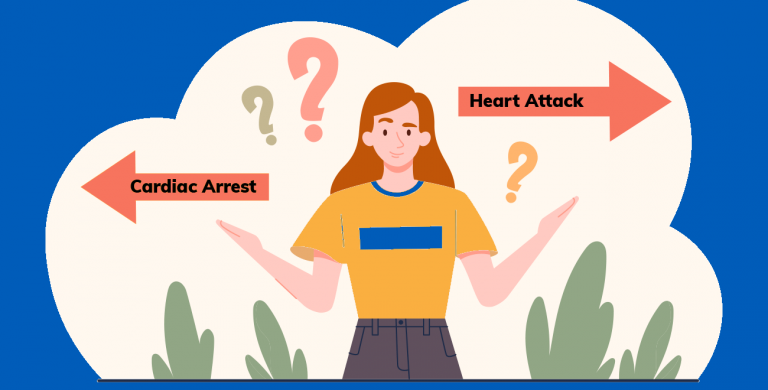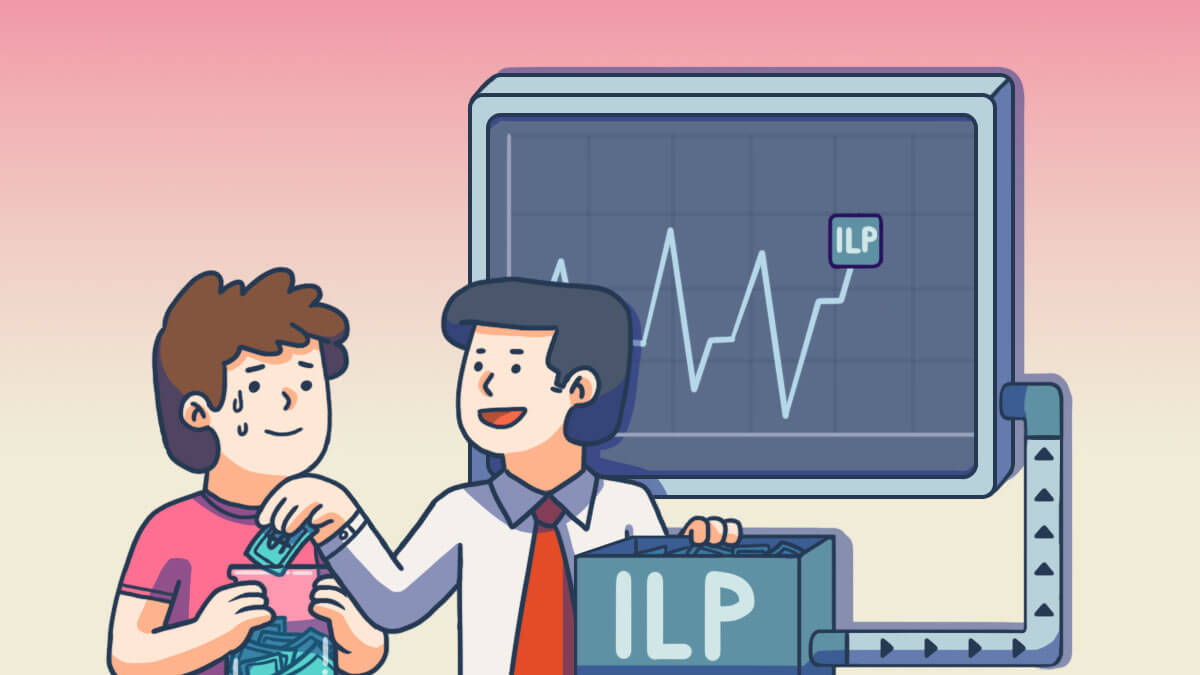A cardiac arrest and a heart attack are two different – but sometimes related – medical emergencies. Learn the difference between a heart attack and a cardiac arrest.
by Elaine Francis, R.N.
A cardiac arrest and a heart attack are two different – but sometimes related – medical emergencies. Learn the difference between a heart attack and a cardiac arrest, their symptoms, and what to do.
Cardiac Arrest vs Heart Attack: Is There A Difference?
Knowing the difference between a heart attack and a cardiac arrest is incredibly important, as they each require a different response and treatment.
Cardiac Arrest
A cardiac arrest is an immediate, life-threatening emergency where someone’s heart becomes severely disordered or stops beating completely. It is usually a problem with the electrical activity of the heart.
A person having a cardiac arrest has no pulse and quickly goes into respiratory arrest — they stop breathing normally. They may still make occasional gasps or unusual breath sounds. A cardiac arrest that occurs outside of a hospital setting is usually a sudden, unexpected incident, and the victim may have no symptoms beforehand and not remember the incident afterwards.
A cardiac arrest needs immediate treatment, and help from a bystander can have a huge impact on the outcome.
Heart Attack
A heart attack – also known as a myocardial infarction (MI) is an acute medical condition where the blood and oxygen supply to the heart muscle is restricted, causing damage to an area of the heart muscle. Typical symptoms of a heart attack include chest pain, sometimes radiating to the jaw or left arm, shortness of breath, and palpitations (an awareness of the heartbeat). The symptoms can vary from person to person, and some people are found to have had a heart attack in the past without having noticed any significant symptoms at all. Heart attacks can range in severity, usually according to the area and amount of heart muscle damaged, but all symptoms of heart attack should be treated as an emergency.
Cardiac Arrest vs Heart Attack: Symptoms
Key differences between the symptoms of cardiac arrest and heart attack include:
Cardiac arrest usually happens suddenly and without warning. Symptoms of heart attack usually show up mildly at first and persist for several hours, days or weeks before a heart attack, but in some cases, they may also be sudden and intense.
In a cardiac arrest, a person has no pulse. Someone with a heart attack usually has a pulse but experiences symptoms like chest pains and shortness of breath.
Symptoms of Cardiac Arrest
The symptoms of cardiac arrest occur suddenly and often without warning.
During a cardiac arrest, a person collapses suddenly and will have no pulse. They may completely stop breathing, or they may take gasping or heaving breaths. They might not have been able to describe any symptoms beforehand, or they may have had symptoms of whatever condition caused the cardiac arrest. When a person loses consciousness they may lose control of their bladder or bowels.
Symptoms of Heart Attack
Heart attack symptoms may also appear suddenly and intensely, but most of the time, it tends to show up mildly at first, then persist and/or worsen over several hours, days or weeks before triggering a heart attack.
The symptoms of heart attack and cardiac arrest differs. A person with heart attack usually still has a pulse, and may experience:
- Central chest pain, often described with words like ‘crushing’, ‘tight’, and ‘heavy’.
- Pain that radiates, typically to the left arm or jaw.
- Sweating — people having a heart attack are sometimes described as looking ‘grey and clammy’.
- Shortness of breath.
- Sudden weakness and fatigue.
- Nausea and vomiting.
Although these are typical signs of heart attack, different people express heart pain in different ways. The pain caused by a heart attack is sometimes confused with indigestion, toothache, or muscle strain. Heart attack symptoms may also differ in women and men.
Heart attacks do not always follow the ‘textbook’ pattern, so if in doubt, seek urgent medical attention.
Cardiac Arrest vs Heart Attack: Causes
Causes of Cardiac Arrest
A cardiac arrest is usually caused by a disruption in the electrical activity that triggers each heartbeat.
Normally, each heartbeat is triggered by a natural electrical impulse. This impulse travels through the tissues of the heart in an organised pattern and the heart muscle contracts in a synchronised, effective way. Without an electrical impulse travelling through the heart muscle, the heart stops beating.
During a cardiac arrest, there is no cardiac output. The heart is not pumping blood, and the person affected has no pulse and very quickly loses consciousness.
There are lots of possible underlying causes for cardiac arrest, but a heart attack or other significant heart disease causes the overwhelming majority of cardiac arrests. Other causes include medications, recreational drugs, and chemical imbalances in the blood.
Causes of Heart Attack
A heart attack occurs when blood flow to the heart is blocked. The main cause of a heart attack is coronary artery disease (CAD).
The heart is a muscle which needs its own blood and oxygen supply, and coronary arteries are the vessels which provide the heart with the nutrients it needs. When there is a blockage or narrowing in a coronary artery, the person is understood to have coronary artery disease. With restricted blood and oxygen supply, the heart muscle becomes damaged and this can result in a heart attack.
Several factors that make us more likely to develop CAD. We have control over some of these; for example, we’re more likely to have a heart attack if we’re overweight, have an unhealthy diet, do not get much exercise, and smoke. But there are some risk factors that we cannot control, like having a strong family history for heart disease, being male, or getting older.
Cardiac Arrest vs Heart Attack: What To Do
Both cardiac arrests and heart attacks are medical emergencies. If you suspect that someone is having a cardiac arrest or heart attack, the first course of action is always to call 995 for emergency services.
What To Do During A Cardiac Arrest
A cardiac arrest is an immediate, life-threatening emergency. A person whose heart has stopped will die within minutes unless they receive treatment quickly.
If you come across an unconscious person or witness someone collapse, calling emergency services should be the first step. Check their breathing and pulse — this shouldn’t take any longer than ten seconds; if there is no pulse or normal breathing sounds, or if you’re not sure, it is best to begin CPR. If there is more than one person present, one should begin chest compressions while the other calls for help.
If a public access defibrillator (AED) is nearby, someone should get it and follow the diagrams and voice prompts to use it on the collapsed person. AEDs are designed to be easy-to-use even without any practise or experience, so anyone can use it to deliver a life-saving shock that might restart the heart. The emergency operator can talk you through it while professional help is on its way.
Courses in first aid and basic life support are widely available and the more people who learn how to save a life, the better the outcomes from out-of-hospital cardiac arrests and other medical emergencies.
What To Do During A Heart Attack
If someone is showing symptoms of a heart attack, they need immediate medical help. Whatever the severity of the heart attack, getting urgent treatment is crucial. The sooner a heart attack is treated, the better the outcome. The longer any heart muscle goes without adequate blood perfusion, the more irreversible tissue damage there will be.
The main thing to do if you suspect someone is having a heart attack is to call an ambulance and stay with them. The call handler for emergency services will talk you through anything you need to do immediately, but a heart attack needs treatment that cannot be provided at home. There may not be much that you can do to help, but watching for changes in their condition and giving emotional support are essential.
What is the link between Cardiac Arrest and Heart Attack?
The terms ‘cardiac arrest’ and ‘heart attack’ are often confused, and it’s easy to see why — ‘cardiac’ and ‘heart’ can be used to mean exactly the same thing; the words ‘arrest’ and ‘attack’ each imply something immediate and serious. The crucial difference in the wording is that an ‘arrest’ means that the heart actually stops.
A cardiac arrest and heart attack are two distinct, but linked, heart conditions. Heart attacks increase the risk of cardiac arrest. In fact, most sudden cardiac arrests occur after a heart attack or during recovery. However, not all heart attacks result in cardiac arrest — only a small minority does.
Knowing what to do when someone has symptoms of a heart attack or cardiac arrest can save lives. If you are unsure, remember that a false alarm is better than a missed opportunity.
At Tiq by Etiqa, we’re always looking for ways to help you be prepared for life’s surprises and inevitabilities, while empowering you to “Live Unlimited” and take control of your tomorrow. In our effort to do that, we have partnered with Homage, an award-winning personal care solution that combines curated and trained care professionals with smart technology. This article is contributed by Homage and first appeared here. All information is correct as at the date of publication on 6 April 2022.







